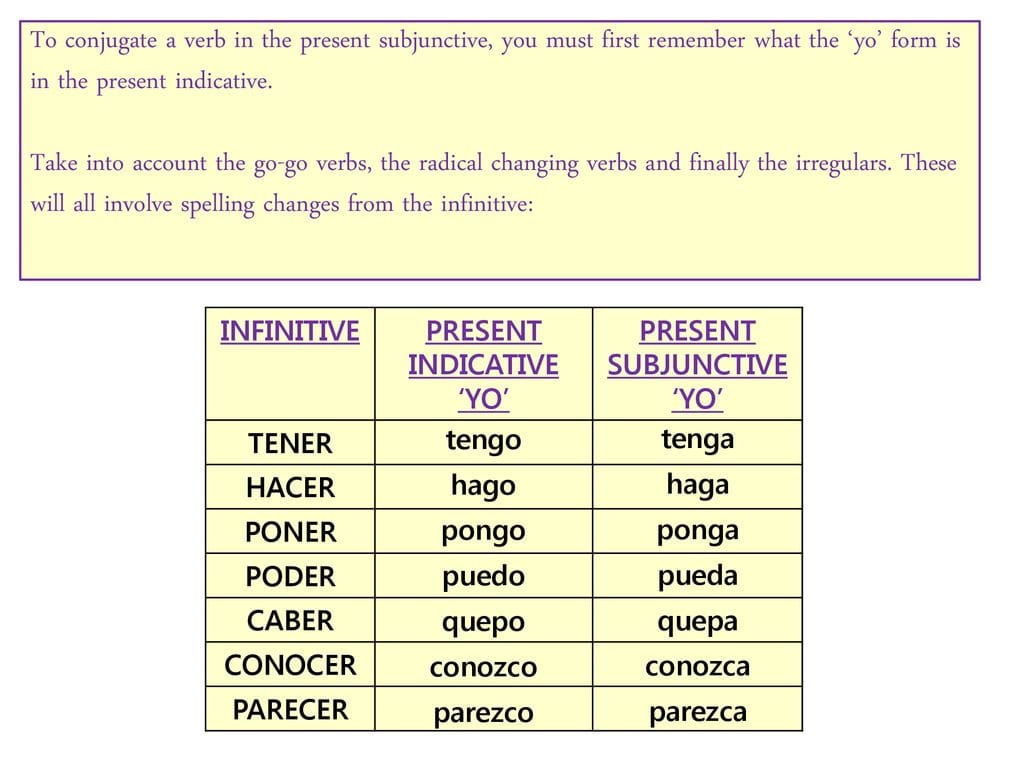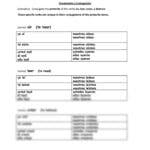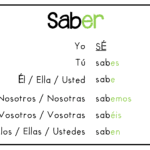Unlock Spanish fluency by mastering the conocer conjugation. This verb, meaning “to know” or “to be acquainted with,” is essential for expressing familiarity with people, places, and experiences. This comprehensive guide will equip you with the knowledge and practical examples you need to use conocer confidently in any situation.
Understanding Conocer
Conocer implies familiarity gained through personal experience, unlike saber, which refers to knowledge of facts or information. This distinction is crucial for accurate communication. For instance, you’d use conocer to say you know a person (“Conozco a Maria”), but saber to say you know a fact (“Sé que la Tierra es redonda”). This guide delves into the nuances of conocer, providing clear explanations and examples.
Conocer in the Present Tense: Expressing Current Acquaintances
The present tense of conocer describes current acquaintances or familiarity. It’s your go-to for expressing who or what you know right now. A key feature of conocer is the stem change from “conoc-” to “conozc-” in the yo and tú forms.
| Pronoun | Conjugation | Example |
|---|---|---|
| Yo | conozco | Yo conozco a tu hermano. (I know your brother.) |
| Tú | conoces | Tú conoces este restaurante. (You know this restaurant.) |
| Él/Ella/Usted | conoce | Ella conoce la respuesta. (She knows the answer.) |
| Nosotros/as | conocemos | Nosotras conocemos a mucha gente aquí. (We know a lot of people here.) |
| Vosotros/as | conocéis | Vosotros conocéis bien la ciudad. (You all know the city well.) (Spain) |
| Ellos/Ellas/Ustedes | conocen | Ellos conocen a mi padre. (They know my father.) |
Conocer in Other Tenses: Exploring Past and Future Familiarity
Conocer, like other Spanish verbs, can be conjugated in various tenses to express familiarity in different time frames. Let’s explore some key tenses beyond the present:
Preterite Tense: Recalling Past Encounters
The preterite tense describes completed actions in the past. Use it to talk about when you met someone or first became acquainted with something.
| Pronoun | Conjugation | Example |
|---|---|---|
| Yo | conocí | Yo conocí a María el año pasado. (I met Maria last year.) |
| Tú | conociste | Tú conociste a mi familia en la fiesta. (You met my family at the party.) |
| Él/Ella/Usted | conoció | Él conoció a su esposa en la universidad. (He met his wife at the university.) |
| Nosotros/as | conocimos | Conocimos a muchos artistas. (We met many artists.) |
| Vosotros/as | conocisteis | Conocisteis a ese autor, ¿no? (You all met that author, right?) (Spain) |
| Ellos/Ellas/Ustedes | conocieron | Ellos conocieron a sus vecinos. (They met their neighbors.) |
Imperfect Tense: Describing Past Familiarity
The imperfect tense portrays ongoing or habitual actions in the past. It suggests familiarity over an extended period.
| Pronoun | Conjugation | Example |
|---|---|---|
| Yo | conocía | Yo conocía a Juan de antes. (I knew Juan from before.) |
| Tú | conocías | Tú conocías este lugar. (You knew this place.) |
| Él/Ella/Usted | conocía | Ella conocía la canción. (She knew the song.) |
| Nosotros/as | conocíamos | Conocíamos esa ciudad. (We knew that city.) |
| Vosotros/as | conocíais | Conocíais a su familia. (You all knew his/her family.) (Spain) |
| Ellos/Ellas/Ustedes | conocían | Conocían bien el barrio. (They knew the neighborhood well.) |
Future Tense: Anticipating Future Acquaintances
The future tense expresses actions that will happen in the future, including meeting new people or experiencing new places.
| Pronoun | Conjugation | Example |
|---|---|---|
| Yo | conoceré | Conoceré a mis suegros la semana que viene. (I will meet my in-laws next week.) |
| Tú | conocerás | Conocerás a mucha gente interesante. (You will meet many interesting people.) |
| Él/Ella/Usted | conocerá | Él conocerá el país pronto. (He will get to know the country soon.) |
| Nosotros/as | conoceremos | Conoceremos nuevos lugares. (We’ll discover new places.) |
| Vosotros/as | conoceréis | Conoceréis a sus amigos. (You all will meet their friends.) (Spain) |
| Ellos/Ellas/Ustedes | conocerán | Conocerán a mi familia en la boda. (They will meet my family at the wedding.) |
Conditional Tense: Expressing Hypothetical Familiarity
The conditional tense discusses hypothetical situations or possibilities, often expressing what one would know under certain circumstances.
| Pronoun | Conjugation | Example |
|---|---|---|
| Yo | conocería | Conocería a ese autor si tuviera la oportunidad. (I would know that author if I had the chance.) |
| Tú | conocerías | ¿Conocerías a alguien famoso? (Would you know anyone famous?) |
| Él/Ella/Usted | conocería | Ella conocería la ciudad si hubiera vivido allí. (She would know the city if she had lived there.) |
| Nosotros/as | conoceríamos | Conoceríamos ese restaurante si no estuviera tan lejos. (We would know that restaurant if it weren’t so far.) |
| Vosotros/as | conoceríais | Conoceríais a mis padres si vinierais a la fiesta. (You all would know my parents if you came to the party.) (Spain) |
| Ellos/Ellas/Ustedes | conocerían | Conocerían la verdad si les dijera. (They would know the truth if I told them.) |
Present Perfect Tense: Bridging Past and Present Acquaintances
This tense describes past actions that still have relevance to the present. It combines the present tense of haber (to have) with the past participle of conocer (conocido).
| Pronoun | Conjugation | Example |
|---|---|---|
| Yo | he conocido | He conocido a personas muy interesantes. (I have met very interesting people.) |
| Tú | has conocido | ¿Has conocido a algún famoso? (Have you met any celebrities?) |
| Él/Ella/Usted | ha conocido | Él ha conocido muchos países. (He has been to many countries.) |
| Nosotros/as | hemos conocido | Hemos conocido a toda su familia. (We’ve met all of his/her family.) |
| Vosotros/as | habéis conocido | ¿Habéis conocido a alguien nuevo? (Have you all met anyone new?) (Spain) |
| Ellos/Ellas/Ustedes | han conocido | Han conocido lugares increíbles. (They’ve been to incredible places.) |
Past Perfect Tense: Describing Actions Before Another Past Action
The past perfect tense talks about something that happened before another action in the past. It uses the imperfect tense of haber and the past participle of conocer.
| Pronoun | Conjugation | Example |
|---|---|---|
| Yo | había conocido | Yo había conocido a Juan antes de la fiesta. (I had met Juan before the party.) |
| Tú | habías conocido | Tú habías conocido a Maria antes que yo. (You had met Maria before me.) |
| Él/Ella/Usted | había conocido | Él había conocido ese lugar en un viaje anterior. (He had visited that place on a previous trip.) |
| Nosotros/Nosotras | habíamos conocido | Habíamos conocido esa canción desde niños. (We had known that song since childhood.) |
| Vosotros/Vosotras | habíais conocido | Habíais conocido a su familia antes de mudaros. (You all had met his/her family before you moved.) (Spain) |
| Ellos/Ellas/Ustedes | habían conocido | Habían conocido a muchos artistas durante sus viajes. (They had met many artists during their travels.) |
Imperative Mood: Giving Commands with Conocer
| Pronoun | Affirmative | Negative | Example |
|---|---|---|---|
| Tú | conoce (tú) | no conozcas (tú) | ¡Conoce la ciudad! (Get to know the city!) |
| Usted | conozca (usted) | no conozca (usted) | Conozca a mi amigo. (Meet my friend.) |
| Nosotros | conozcamos | no conozcamos | Conozcamos nuevas culturas. (Let’s discover new cultures.) |
| Vosotros | conoced (vosotros) | no conozcáis (vosotros) | ¡Conoced a mis padres! (Meet my parents!) (Spain) |
| Ustedes | conozcan (ustedes) | no conozcan (ustedes) | Conozcan este restaurante. (Try this restaurant.) |
Conocer vs. Saber: Clarifying the Confusion
While both conocer and saber translate to “to know” in English, they convey distinct meanings. Conocer implies familiarity or acquaintance, while saber denotes knowledge of facts or information. connaitre conjugation
| Verb | Meaning | Example |
|---|---|---|
| Conocer | To be familiar with (people, places, things) | Conozco a Juan. (I know Juan.) |
| Saber | To know (facts, information, skills) | Sé hablar español. (I know how to speak Spanish.) |
This distinction is a cornerstone of Spanish grammar. Mastering it is essential for avoiding misunderstandings and expressing yourself accurately.
Regional Variations: Vosotros
The use of vosotros (and its corresponding conjugations like conocéis) is primarily limited to Spain. In Latin America, ustedes is generally used for the informal plural “you,” even in casual conversations. While understanding the vosotros forms is important for comprehending Peninsular Spanish, using ustedes will likely be more practical for most learners.
Common Mistakes with Conocer
Learners often confuse conocer and saber. Another common error is forgetting the personal a when conocer is followed by a person. For example, “Conozco Maria” is incorrect; it should be “Conozco a Maria.” Paying attention to these details will significantly enhance your accuracy.
Tips for Mastering Conocer
- Practice Regularly: Consistent practice is key. Try incorporating conocer into daily conversations or writing exercises.
- Focus on the Stem Change: Pay special attention to the stem change in the present tense. This is a common tripping point for learners.
- Use Flashcards or Apps: Flashcards and language learning apps can help you memorize conjugations effectively.
- Immerse Yourself in Spanish: Surrounding yourself with Spanish through music, movies, or conversations can reinforce your learning.
By understanding the nuances of conocer and practicing its conjugations, you’ll unlock a new level of fluency and connect with the Spanish language in a more meaningful way.
- Star Ring Trends: Etsy vs Amazon - March 28, 2025
- Boost Pollinator Habitats: Baby Blue Eyes Sustainable Farming Guide - March 28, 2025
- Protect Big Black Bears: Effective Conservation Strategies - March 28, 2025
















